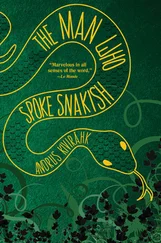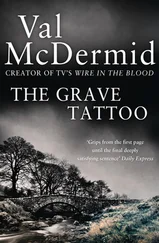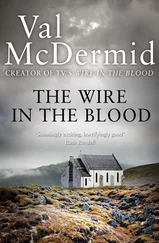Dejectedly, he recalled that soon he would have to leave all this and move over to the south police headquarters in the rowdy neighbourhood around Västberga Allé.
Behind him he heard someone fling open the door and come into the room. He did not need to turn around to know who it was. Stenström. Stenström was still the youngest in the department and after him there would presumably be a whole generation of detectives who did not knock on doors.
‘How's it going?’ he said.
‘Not so well,’ said Stenström. ‘When I was there fifteen minutes ago he was still flatly denying everything.’
Martin Beck turned around, went back to his desk and once again looked at the photo of the scene of the crime. On the ceiling above the newspaper mattress, the ragged quilt and the striped pillow, there was an old patch of dampness. It looked like a sea horse. With a little good will it could have been a mermaid. He wondered if the man on the floor had had that much imagination.
‘It doesn't matter,’ said Stenström officiously. ‘We'll get him on the technical evidence.’
Martin Beck made no reply. Instead he pointed at the thick report Stenström had put down on his desk and said, ‘What's that?’
‘The record of the interrogation from Sundbyberg.’
‘Take the miserable thing away. Starting tomorrow I'm on my holiday. Give it to Kollberg. Or to anybody you damn please.’
Martin Beck took the photograph and went up one flight of stairs, opened a door and found himself with Kollberg and Melander.
It was much warmer in there than in his room, presumably because the windows were closed and the curtains drawn. Kollberg and the suspect were sitting opposite each other at the table, quite still. Melander, a tall man, was standing by the window, his pipe in his mouth and his arms folded. He was looking steadily at the suspect. On a chair by the door sat a police guard in uniform trousers and a light-blue shirt. He was balancing his cap on his right knee. No one said anything and the only moving thing was the reel of the tape recorder. Martin Beck situated himself to one side and just behind Kollberg and joined in the general silence. A wasp could be heard bouncing against the window behind the curtains. Kollberg had taken off his jacket and unbuttoned his shirt, but even so, his shirt was soaked with sweat between his plump shoulder blades. The wet patch slowly changed shape and spread downward in a line along his spine.
The man on the other side of the table was small, with thinning hair. He was slovenly dressed and the fingers gripping the arms of his chair were uncared-for, with bitten, dirty nails. His face was thin and sickly, with weak evasive lines around his mouth. His chin was trembling slightly and his eyes seemed cloudy and watery. The man hunched up and two tears fell down his cheeks.
‘Uh-huh,’ said Kollberg gloomily. ‘You hit him on the head with the bottle, then, until it broke?’
The man nodded.
‘Then you went on hitting him with the chair as he lay on the floor. How many times?’
‘Don't know. Not many. Quite a lot though.’
‘I can imagine. And then you tipped the sideboard over him and left the room. What did the third one of you do in the meantime? This Ragnar Larsson? Didn't he try to interfere; I mean, stop you?’
‘No, he didn't do anything. He just let it go on.’
‘Don't start lying again now.’
‘He was asleep. He'd passed out.’
‘Try to speak a little louder, all right?’
‘He was lying on the bed, asleep. He didn't notice anything.’
‘No, not until he came to and then he went to the police. Well, so far it's clear. But there's one thing I still don't really understand. Why did it turn out this way? You'd never even seen each other before you met in that beer hall.’
‘He called me a damned Nazi.’
‘Every policeman gets called a damned Nazi several times a week. Hundreds of people have called me a Nazi and Gestapo man and even worse things, but I've never killed anyone for it.’
‘He sat there and said it over and over again, damned Nazi, damned Nazi, damned Nazi… It was the only thing he said. And he sang.’
‘Sang?’
‘Yes, to get my goat. Annoy me. About Hitler.’
‘Uh-huh. Well, had you given him any cause to talk like that?’
‘I'd told him my old lady was German. That was before.’
‘Before you began drinking?’
‘Yes. Then he just said it didn't matter what kind of mother a guy had.’
‘And when he was about to go out into the kitchen, you took the bottle and hit him from behind?’
‘Yes.’
‘Did he fall?’
‘He sort of fell to his knees. And began bleeding. And then he said, “You bloody little Nazi runt, you, now you're in for it.” ’
‘And so you went on hitting him?’
‘I was … afraid. He was bigger than me and … you don't know what it feels like … everything just goes round and round and goes red … I didn't seem to know what I was doing.’
The man's shoulders were shaking violently.
‘That's enough,’ said Kollberg, switching off the tape recorder. ‘Give him something to eat and ask the doctor if he can have a sedative.’
The policeman by the door rose, put his cap on and led the murderer out, holding him loosely by the arm.
‘Bye for now. See you tomorrow,’ said Kollberg absently.
At the same time he was writing mechanically on the paper in front of him, ‘Confessed in tears.’
‘Quite a character,’ he said.
‘Five previous convictions for assault,’ said Melander. ‘In spite of his denying it every time. I remember him very well.’
‘Said the walking card file,’ Kollberg commented.
He rose heavily and stared at Martin Beck.
‘What are you doing here?’ he said. ‘Go take your holiday and let us look after the criminal ways of the lower classes. Where are you going, by the way? To the islands?’
Martin Beck nodded.
‘Smart,’ said Kollberg. ‘I went to Rumania first and got fried-in Mamaia. Then I come home and get boiled. Great. And you don't have any telephone out there?’
‘No.’
‘Excellent. I'm going to take a shower now anyhow. Come on. Run along now.’
Martin Beck thought it over. The suggestion had its advantages. Among other things, he would get away a day earlier. He shrugged his shoulders.
‘I'm leaving. Bye, boys. See you in a month.’
Most people's holidays were already over and Stockholm's August-hot streets had begun to fill with people who had spent a few rainy July weeks in tents and trailers and country boarding-houses. During the last few days, the subway had once again become crowded, but it was now the middle of the working day and Martin Beck was almost alone in the car. He sat looking at the dusty greenery outside and was glad that his eagerly awaited holiday had at last begun.
His family had already been out in the archipelago for a month. This summer they had had the good fortune to rent a cottage from a distant relative of his wife's, a cottage situated all by itself on a little island in the central part of the archipelago. The relative had gone abroad and the cottage was theirs, until the children went back to school.
Martin Beck let himself into his empty flat, went straight into the kitchen and took a beer out of the refrigerator. He took a few gulps standing by the sink, then carried the bottle with him into the bedroom. He undressed and walked out onto the balcony in nothing but his shorts. He sat for a while in the sun, his feet on the balcony rail as he finished off the beer. The heat out there was almost intolerable and when the bottle was empty, he got up and went back into the relative cool of the flat.
Читать дальше












